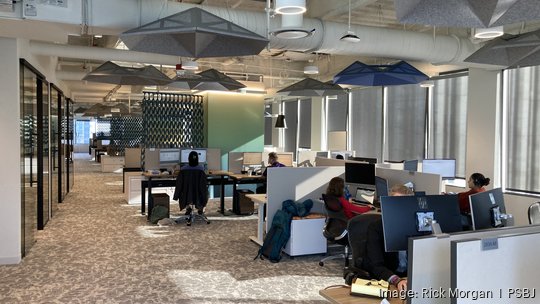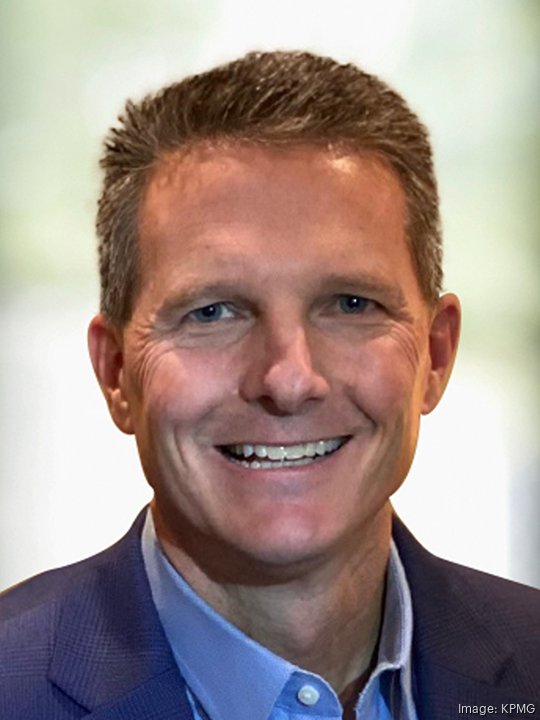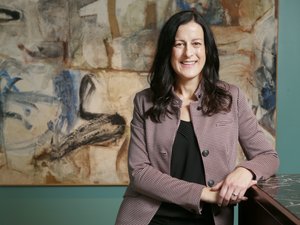
Accounting firms are ditching the stereotype of cramped cubicles filled with math wizards crunching numbers all day.
As clients continue to prioritize technology, major accounting and consulting firms are beefing up their tech practices to keep pace. Given strict rules around conflicts of interest for firms that provide both audit and consulting services, it’s a balancing act.
“For Deloitte, consulting and technology specifically, for the better part of 20 years have been pretty pivotal,” said Don Heisler, Seattle office managing partner at Deloitte. “Most of our large, if not all of our largest consulting clients, where we’re implementing significant technology capabilities, are not audit clients of the firm.”
Strict enforcement around accounting firms and their consulting practices came in the wake of the Enron scandal. Accounting firm Arthur Andersen, then one of the “Big Five” accounting firms, mishandled audits of Enron and was convicted of obstruction of justice, but the conviction was later overturned. The firm dissolved and sold its businesses off to competitors, including what is now called the “Big Four,” comprised of Deloitte, KPMG, PwC and EY.
The Enron scandal also resulted in the Sarbanes-Oxley Act of 2002, which created the Public Company Accounting Oversight Board. The law also restricts auditing companies from providing consulting services to the same client, limiting conflicts of interest.
For Deloitte, this means the firm must make decisions when a consulting client asks for audit help or vice versa. Cannibalizing its own business is a concern.
“Sometimes we are asked to consider changing the relationship we have with a client, and as one might imagine, one has to delicately maneuver not only what is best for us as a firm and our professionals by geography or nationally, but what’s in the best interest of the client as well,” Heisler said. “There’s a lot of considerations that go into that balancing act.”

By the numbers
40%: Rough percentage of Deloitte’s revenue that comes from audit and tax
60%: Rough percentage of Deloitte’s revenue that comes from advisory and consulting
1,700 to 1,800: Employees Deloitte has based in the Seattle area
700: Employees KPMG has based in the Seattle area
57,163: Square feet KPMG has at Rainier Square in downtown Seattle
According to Heisler, Deloitte didn’t sell off its consulting business after Enron and Sarbanes-Oxley, as the firm felt it could build it in conjunction with the law. Other firms, he added, sold their consulting businesses and have since had to rebuild them. He said because the market is so large, there’s plenty of opportunity for all firms to grow their business despite rules around conflicts of interest.
Heisler said about 40% of Deloitte’s revenue comes from the audit and tax side of its business. The remaining 60% comes from advisory and consulting. He said a substantial portion of that 60% comes from tech consulting, either directly or indirectly. Deloitte has roughly 1,700 to 1,800 employees based in the Seattle area.
After serving as Seattle office managing partner at KPMG for nine years, Mark Gibson is now the firm’s national leader for technology, media and telecommunications. Gibson noted that not only is the technology sector becoming a larger portion of KPMG’s business, every consulting sector is becoming more and more tied to technology.
“I often talk about tech as being a vertical for KPMG providing services to those companies, as well as a horizontal for KPMG,” Gibson said. “We need tech skills and professionals that have technology skills to serve any sector these days.”
Amy Banovich now serves as KPMG’s Seattle office managing partner. She joined the firm after the Enron scandal and implosion of Arthur Andersen, where she had worked for seven years.
As for which clients get which services, Gibson said clients really need to decide if KPMG will work with them on the audit side or the consulting side. He added that KPMG, which has about 700 employees based in Seattle, divested part of its consulting business in the 2000s, but the firm has rebuilt its consulting business to meet market demand.

Both KPMG and Deloitte recruit tech talent from a variety of sources, including college campuses and tech companies. The firms will also occasionally make acquisitions to gain new talent. Gibson said KPMG also prioritizes upskilling its current workers if they want to move into tech.
At the start of last year, KPMG acquired Seattle-based tech consulting firm The Arnold Group for an undisclosed amount. KPMG gained 21 employees through the acquisition. The firm is also adding a third floor at Rainier Square in downtown Seattle, which will bring its total space at the tower to 57,163 square feet. The third floor is set to open in late summer.
As artificial intelligence continues to improve and become more of a priority for businesses, Gibson said KPMG is working with clients to figure out the best ways to deploy the technology. Specifically, clients are interested in the most ethical ways to use AI.
“That’s where we play even more,” Gibson said. “More and more consumers and businesses are accepting the fact that AI is here. It generally has more positives than negatives, but it has a lot of risks and challenges around how do you use it ethically. How do you make sure you’re protecting against scams and fake content?”








